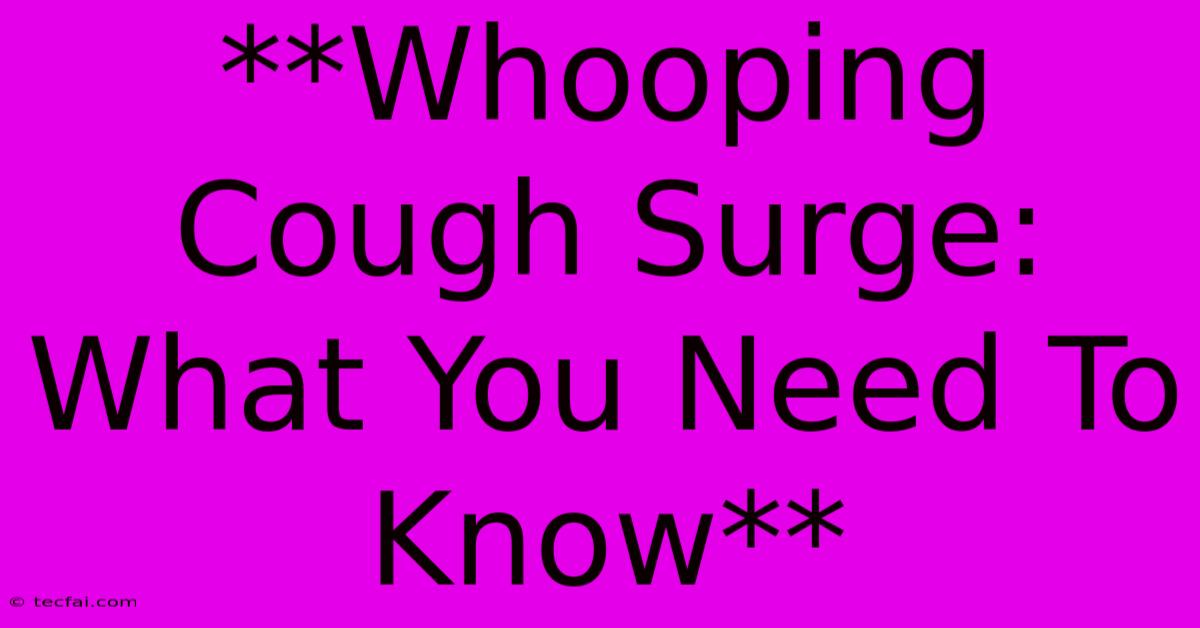**Whooping Cough Surge: What You Need To Know**

Discover more detailed and exciting information on our website. Click the link below to start your adventure: Visit Best Website tecfai.com. Don't miss out!
Table of Contents
Whooping Cough Surge: What You Need to Know
The resurgence of whooping cough, also known as pertussis, is a growing concern across the globe. This highly contagious respiratory illness, characterized by its distinctive "whooping" cough sound, poses a significant threat, especially to infants and young children. Understanding the causes, symptoms, and prevention methods is crucial to protect yourself and your loved ones.
What is Whooping Cough?
Whooping cough is caused by the bacterium Bordetella pertussis. It spreads through the air when an infected person coughs or sneezes, releasing tiny droplets containing the bacteria. These droplets can be inhaled by others, leading to infection.
Symptoms of Whooping Cough
The symptoms of whooping cough can vary depending on age. In infants, it may present with a persistent cough, difficulty breathing, apnea (temporary pauses in breathing), and poor feeding. Older children and adults may experience a more typical cough, often with a distinctive "whooping" sound that occurs during inhalation. Other symptoms may include:
- Runny nose
- Low-grade fever
- Fatigue
- Vomiting
Whooping Cough: A Threat to Infants
Infants are particularly vulnerable to severe complications from whooping cough. Their small airways can easily become blocked, leading to respiratory distress, pneumonia, seizures, and even death. Vaccination is the most effective way to protect infants from this potentially deadly illness.
The Importance of Vaccination
The DTaP vaccine, which protects against diphtheria, tetanus, and pertussis, is highly effective in preventing whooping cough. It is typically administered in a series of shots beginning at two months of age. Boosters are recommended for children and adults to maintain immunity.
Staying Safe During a Whooping Cough Outbreak
While vaccination is the most crucial step in preventing whooping cough, there are other measures you can take:
- Wash your hands frequently. Use soap and water for at least 20 seconds, especially after being in public areas or coming into contact with someone who is sick.
- Avoid close contact with sick people. If you are sick, stay home to prevent spreading the illness.
- Cover your mouth and nose when you cough or sneeze. Use a tissue or cough into your elbow.
- Practice good hygiene. Clean and disinfect surfaces that may be contaminated with the bacteria.
Seeking Medical Attention
If you suspect you or your child may have whooping cough, it's crucial to see a healthcare provider immediately. They can diagnose the illness and prescribe appropriate treatment, often including antibiotics. Prompt treatment can help reduce the severity of the infection and prevent complications.
Conclusion
The resurgence of whooping cough highlights the importance of vaccination and other preventive measures. By understanding the symptoms, transmission, and prevention methods, we can protect ourselves and our communities from this potentially dangerous illness. Remember, vaccination remains the most effective way to fight whooping cough and keep our children safe.

Thank you for visiting our website wich cover about **Whooping Cough Surge: What You Need To Know** . We hope the information provided has been useful to you. Feel free to contact us if you have any questions or need further assistance. See you next time and dont miss to bookmark.
Featured Posts
-
Mourinho Istanbul Premier League Uefa Interview
Nov 08, 2024
-
Trinity Students Fall For Paul Mescal
Nov 08, 2024
-
Bbc Star Ashley Jensens Resilience Story
Nov 08, 2024
-
New Childrens Book United Heroes
Nov 08, 2024
-
Aclu Indiana Wins Legal Challenge Against State
Nov 08, 2024
